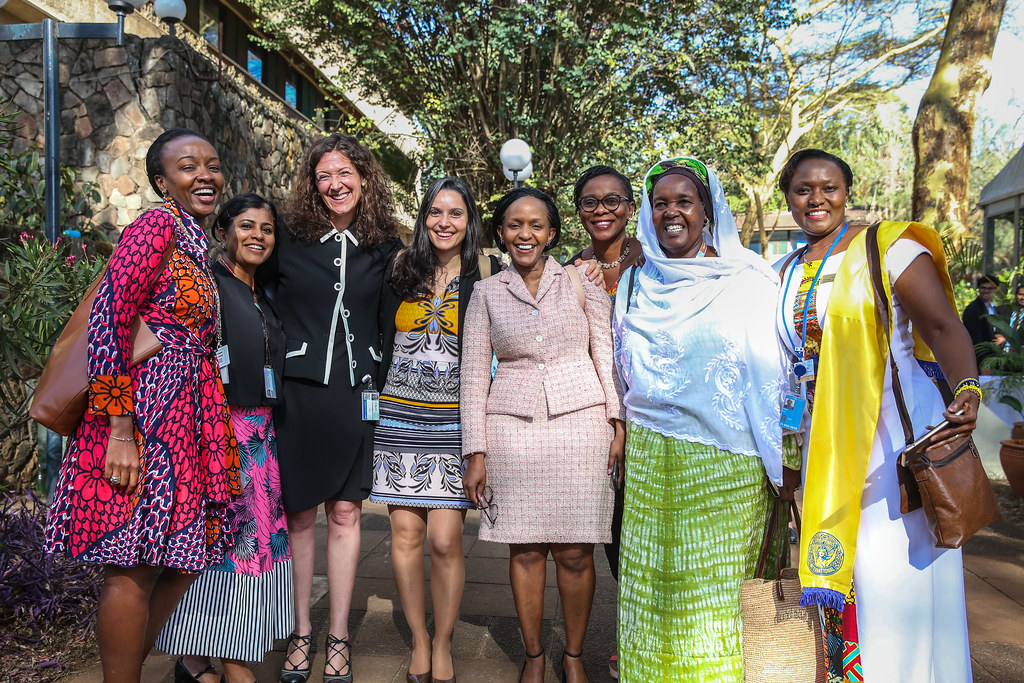There were days when the si tuende lunch? requests would hardly come the way of Petite Mukami, who has been a mortician since 2020.She was working at a rural hospital then. While other staff would seek out one another to go for lunch or elsewhere, they snubbed her, leaving her with her “silent” customers. She would engross herself in books to cope.“I read a lot of books because there were no people to talk to,” she remembers.This was during her first posting as a mortician. But that changed with time, after she proved to her colleagues that she wasn’t your ordinary mortician — a drug-abusing, ill-tempered person placed there because no one else wanted to be there. She was there to give dignity to the departed. To wash, dress, preserve. To make post-mortems possible. To help grieving families cope. She was accepted in the workforce and in the community at large.“They started warming up because they would see the work you do, they would see you’re normal, you’re not drinking, you’re not irresponsible, so, with time, they warmed up and we became good friends until I was transferred,” she recalled.Today, Ms Mukami is the officer in charge of morgue services in Murang’a County, based at the Murang’a Level Five Hospital.Kilometres away in Machakos County, Mary Nzilani, who has been a mortician for 16 years, is hard at work to prepare the departed at the Machakos County Referral Hospital mortuary.Near the mortuary is a flower garden that Ms Nzilani started two years ago.“This is our home. We cook and take our meals from here. Some of us spend the night here. That is why we have taken it upon ourselves to keep it beautiful. Importantly, the various flowers calm our grieving clients,” Ms Nzilani said.Ms Mukami and Ms Nzilani represent a growing number of women who are braving it all to be in what has erstwhile been considered a man’s job and are determined to change the way things are done.Both are on a mission to show that morgues are not playgrounds for social misfits but sections which need all the tender loving care that a person can give.Ms Nzilani, in fact, considers morgues to be sanctuaries.How did they find themselves taking care of the dead?In the case of Ms Mukami, it started with watching detective shows that inspired her to be a forensics expert. It was a desire so deep that even after obtaining a Bachelor of Commerce degree from the Catholic University of Eastern Africa (where she majored in commerce and accounting), she found herself drifting into the field.“I will use it at some point,” she said of her university degree.Having secured her degree, she took a certificate course in mortuary science at the University of Nairobi. That qualification helped her get a job in Murang’a County, where she has been since.“I’ve been in the field since 2020,” she said, noting that being a mortician is somewhere close to the forensics job she adored because “we do more of the same things”.In Ms Nzilani’s case, it was a matter of finding her best fit.She started as a community clerk at Masii Sub-county hospital in Machakos County. The position entailed serving as a receptionist. She was a link between the facility and the community. Hard work and diligence saw her transferred to Machakos County Referral Hospital where she worked as a patient attendant on a renewable contract.In 2009, she resigned and embarked on searching for greener pastures. This is how she ended up at Montezuma Monalisa Funeral Home in Machakos town. She expected to land a tea girl position but ended up being placed on a mortuary attendant apprenticeship programme which saw her learn the mortician ropes in a fast-paced environment.She believes God had ordered her steps, saying, “I am now in the right place”.Inspiring leadershipA team of 10 mortuary attendants work under Ms Nzilani. Their day starts with ensuring that the facility is clean. They then ensure that the bodies are in good shape. The bulk of mortuary work entails embalming and applying makeup on bodies as requested by clients. They also work closely with pathologists to facilitate post-mortem examinations. Often, Ms Nzilani’s team finds itself consoling grieving clients.“The first thing to do to a client with a heavy heart is demonstrate that you care by making their stay at the facility comfortable by showing them a place to relax. Once they have calmed down you should talk to them calmly, telling them that death is inevitable since we are all human, and then urge them to take heart,” Ms Nzilani said.She was in a great mood as she spoke with us, laughing heartily in some instances, but before she became this relaxed, there were demons she had to fight.“It took me a long time to come to terms with the sight of the body of someone I had interacted with before their death. This is no longer the case,” she said.In recent years, she has seen an influx of young people expressing interest in working as mortuary attendants. The facility has been a magnet of Kenya Medical Training College students seeking internship opportunities.“We currently have four interns. When they are not working, they are on TikTok,” she said. The youthful morticians hold Ms Nzilani in high esteem. They have nicknamed her Mathe, slang for mother.Although she is excited about the growing interest in mortuary attendant jobs among young people, she urges caution.“Working in a mortuary is not a cup of tea. In this facility, we used to have mortuary attendants turning to alcohol and marijuana to cope with the trauma which comes with exposure to dead bodies and interaction with grieving clients. This is no longer the case. Today, we advise mortuary attendants to turn to prayers whenever they are overwhelmed. One of our morticians is a pastor. He is always on standby whenever a mortician is overwhelmed with emotions,” she said.Apart from prayer, Ms Nzilani and her team have turned to landscaping to unwind. Machakos Health Executive Justus Kasivu said the morticians also go through regular counselling.In Ms Mukami’s view, there is a need for more counsellors working with morticians. She feels that the health system imagines they are tough cookies who do not need mental health support.An example often used in their circles is that of a mass casualty incident that happened somewhere Kenya. As the dust settled down, those who were involved were offered counselling sessions, but the morticians were snubbed with the words, “we don’t have money”. A female mortician started having nightmares after that incident, but she couldn’t tell her supervisors because they thought she was ‘tough’.“It’s like you are supposed to be hardened by your job,” said Ms Mukami. “People think that we’re emotionless, but we are not. If you are emotionless, how do you deal with grieving families? You need to be aware of emotions for you to deal with someone who is grieving, right?”Psychological supportShe was involved in an academic study a few months ago which showed that most morticians turn either to their families or to fellow morticians for psychological support.“What we need is a counsellor who is available or who is curated to what we go through in the mortuaries, because I’ll not go to a counsellor who is in the hospital, yet she does not even have an idea of what I go through during the day,” says Ms Mukami.She notes that many things happen that cause trauma in morticians. For her, the sight of a man crying often haunts her.“Mostly, I am triggered when I see a man crying because men are not used to crying. Women, we cry every time, or a lot. For men, it’s hard to see them crying. So, when you see a man crying for their baby and they are wailing, it triggers you, and it makes you see that indeed what you’re doing is not easy. But you must be there for them, even the grieving families,” says Ms Mukami.She notes that a mortician does not cater to the deceased only: “There’s the deceased, there’s the grieving family, and then there’s your work now. So, you don’t just cater to one person.”Ms Mukami is part of the Kenyan Funeral Peer Support Group, which started in 2022.“We hold quarterly meetings where we find a topic, let’s say compassion fatigue or what we go through,” she says. “So far, we’ve had about 10 sessions. It has been going well.”Given her attractive looks and her eloquence, Ms Mukami says many people get shocked to learn that she cares for the dead for a living.“Someone comes, they see you, and in their mind they’re like, ‘Wow, kumbe kuna warembo huku (Wow, there are beauties here as well)?’” she said. “When they come to where you work, I think they expect someone who has dents, is drunk. Then they find someone who can converse well, even in English.”“I would say we are trying to professionalise the industry, and it started way back. It’s just that now even counties are employing professionals, unlike back then where, if maybe you work within the hospital, maybe you have made a mistake, then as a punishment you’re taken to the morgue. Now, they see the value of having professionals in mortuaries,” she said.The attributes of a professional, Ms Mukami said, include the ability to handle clients, to apply the latest body preservation techniques and to deal with the mental load without abusing drugs.Ms Mukami also notes that the number of women in the field is increasing.“Of course, the men are still leading, but the number of ladies is increasing,” she said.Due to her work, she noted, she has inspired other women to join the profession.“I think I’ve taken more than 10 to school, and at least guided them on where to go. And even when they get attachment, they can come to the facility where I work and we keep on pushing them. We have so many students who have joined (this career) because of seeing the work we do,” noted Ms [email protected]@gmail.com Provided by SyndiGate Media Inc. (
Syndigate.info
).
Kenya’s Female Morticians: Shattering Stereotypes One Coffin at a Time













